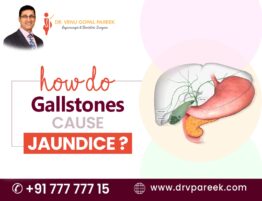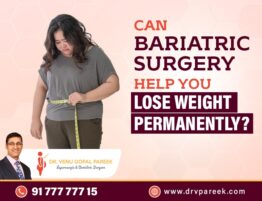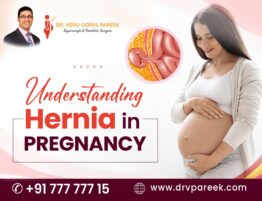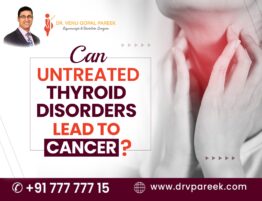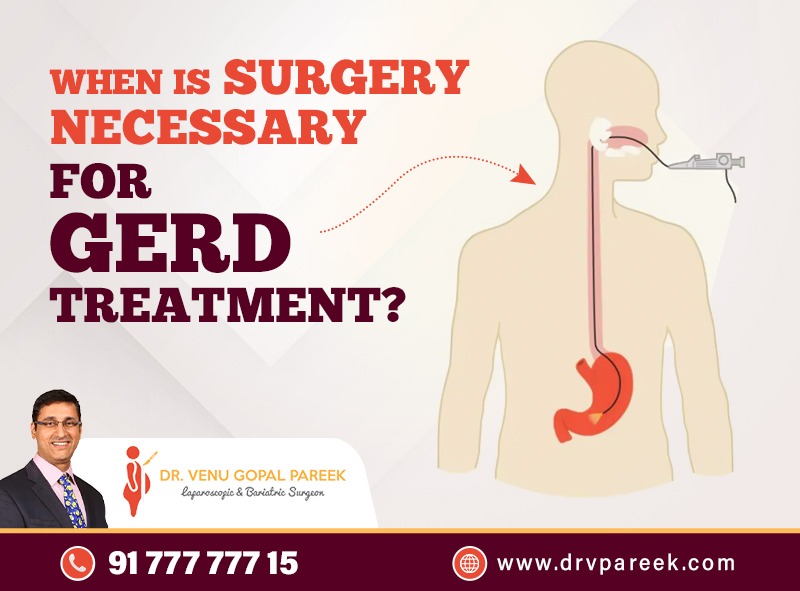
GERD (Gastroesophageal Reflux Disease). Millions of individuals throughout the world suffer from GERD, and its frequency is increasing. It is a chronic disorder of the digestive system where stomach acid or bile flows back into the oesophagus, and develops as a number of uncomfortable symptoms. Heartburn, pain in the chest, swallowing problems, and chronic cough are some of the signs and symptoms indicating GERD.
Living with GERD can be difficult since it frequently requires considerable food and lifestyle adjustments. However, with proper information and guidance from experts about GERD, one can control symptoms and prevent complications effectively.
While many people can manage GERD effectively, surgery may sometimes be required. In this blog, Dr. V Pareek, one of the best gastric surgeons in Hyderabad, explains when surgery is required for GERD, discusses various surgical options, and also provides insights into the benefits, threats, and recovery associated with surgical procedures. We intend to provide you with the information you need to decide for yourself whether surgery is a good option for you and how it can reduce your GERD symptoms and enhance your quality of life in general.
In the following circumstances, GERD surgical treatment is advised:
On an individual basis, after consulting a healthcare professional for assessment, the choice to go ahead with surgical treatment is decided.
- Pain and other symptoms that persist despite taking all available medications
- Being affected by an inflammatory condition called Barrett’s oesophagus
- Development of recurrent stricture(narrowing of the oesophagus) while on medical therapy
- Development of recurrent bleeding or ulcer during medical therapy
- Development of respiratory problems due to the absorption of stomach acid.
- Even after using medicine to treat heartburn, if regurgitation still occurs
- People who require lifelong therapy with medications can opt for surgery, especially young people as they can get a permanent solution and limits the need for lifelong medication
- Having trouble taking the medication or not wanting to take them
Overall failure of medical therapy or other medications and lifestyle modifications do not effectively control GERD symptoms, surgery may be considered.
Which provides better results for GERD problems-medicine or surgery
The efficacy of GERD treatment, either through medicine or surgery, relies on a number of factors and differs from one person to the other. Both the methods have their own benefits and considerations.
Proton pump inhibitors (PPIs) are often the first line of treatment prescribed for GERD as they can effectively manage symptoms and reduce the production of acid in the stomach. PPIs can be used on a long-term basis as they are effective in providing relief for many people and are naturally well-tolerated.
Surgery for GERD is generally recommended when conservative and lifestyle modifications have failed to control signs and symptoms or in case of specific signs indicating the need for surgery. Fundoplication or the LINX is a popular surgical procedure for GERD, that intends to strengthen the lower oesophageal sphincter (LES) or resolve underlying anatomical problems, like a hiatal hernia. Surgery may be able to offer long-lasting relief and lessen or completely eliminates the necessity for medications. However, surgery is generally recommended for people who meet certain medical criteria.
The decision of undergoing surgery or continuing with medication generally depends on the severity of symptoms, the frequency and duration of medication use, the existence of medical complications, the priorities of the individual, and the guidance of doctors. The best course of treatment must be decided after a comprehensive evaluation and discussions with a medical professional for each unique instance.
Why don’t all GERD patients have surgery?
Experts say that around 25% of patients who suffer from GERD are able to get better once they start to modify their lifestyle under the supervision of professionals, and they no longer require medication. Another 25% to 50% of people will experience symptoms, but they only need medicines occasionally or a low-dose, constant medication. Only around 25% of those with GERD will experience serious signs and fall into the above-mentioned categories.
The simplest and most common fundoplication operation is performed laparoscopically, which avoids the necessity for significant chest incisions. For detailed information consult Dr. Venugopal Pareek, one of the top laparoscopic surgeons in Hyderabad. With 17 years of experience in the field, Dr. Pareek has likely acquired great knowledge and expertise in laparoscopic surgery. If you are looking for a laparoscopic surgeon, it is advisable to reach us at +91 91-777-77715 and make your appointment.




